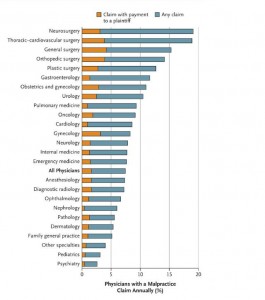
In this article I will highlight some of the best online resources for researching physician salaries by specialty. I will explain why each site is good and why each site is less than idea. I do not print out any of the salary information. I recently wrote another article where all the salary information from these sites is printed. “The Ultimate Guide to Physician Salaries” is a complete analysis of all physician salary data online. You no longer have to google ‘physician salary’ to find all the best information, the Ultimate Guide to Physician Salary has it all laid out in one place.
The longer you are a medical student, the more you will think about this question. In most academic medicine circles, it is taboo to discuss salaries and earnings. However, this is an important question and one that SHOULD NOT make you feel guilty. The information is important in planning your life, budgeting your money and loan dollars, and in choosing a specialty.
There are a number of ways to research physician salaries, none of which is perfect. When conducting this research you must remember that most private physicians own their own practice, are not employed, and therefore do not have an easy reportable income. In this article we will review the best online resources to research physician salaries, and the pros and cons of each resource. You should remember that most of these numbers come from email or snail mail surveys with small response rates, so the numbers will vary. If the data you find online do not come from large physician surveys, they are probably not reliable. Below I outline four very reliable sources.
#1 Medscape Physician Compensation Report

Each year Medscape conducts an enormous survey of physicians of every specialty (see my dedicated article about the newest report). To access the results of the survey you must be a member of Medscape/Web MD. This is a free service that I would suggest to all medical students even if you do not access their survey results (membership also provides free access to the best ipod/ipad/iphone apps for medical school which I discuss here).
Access to the site allows you to view the data for all specialties of medicine. Medscape publishes one conglomerate presentation where they compare compensation among all specialties, all practice settings (private vs. multi specialty group vs. academic), and all locations (urban vs. rural). In addition, they publish a presentation for each sub-specialty where they explore gender effects, time spent with patients, patient visits in a week, geographical sector (east coast vs. west coast vs. south vs. mid-west), and other factors affecting compensation.
http://www.medscape.com/features/slideshow/compensation/2011/
(login needed)
PROS:
Represents responses from over 15,000 physicians, the largest report of its kind.
Neat display and graphics
Tons of extra information about location, practice setting, etc
Updated yearly
They report the changes to compensation from year to year
Access to their site provides many other benefits (apps)
CONS:
You must have a login, which is free and non-intrusive
#2 Careers in Medicine website

As I discussed in a previous article, the Careers in Medicine (CiM) website is a fantastic resource for all medical students. The site provides tools to understand personality traits, which specialties you might enjoy the most, and ample information about each specialty in medicine. One of the best parts about the website is the unbiased salary information they provide about each specialty and some sub-specialties.
Once you are logged on (medical school email address required) you will have to find the links to specialty pages, and then find the compensation tab. These information reported is survey information and is updated periodically. They offer the unique ability to compare academic salaries to those of private practitioners in each specialty and sub-specialty. In addition, they report the salary information broken up into “First three years of career” and “Late career” to compare how compensation might change as your practice gets settled.
https://www.aamc.org/students/medstudents/cim/
PROS:
Unbiased information available only to medical students
Compare compensation of academic to private practice physicians
Part of a great web resource for all medical students
Includes ample information about each specialty
CONS:
You must have a login, which is free for all medical students
There is not compensation information about smaller sub-specialties
#3 Merritt Hawkins

Merritt Hawkins is another web-based survey company that conducts an annual physician compensation survey. Their data, however, is a little different than the other companies. The report the results of salary and incentives offered to physicians through head-huThe results of their survey are open to the public. They conduct a number of great analyses including identifying the most recruited specialties, where to find probono medical work, and their salary information.
Their main site provides links to all the above information
http://merritthawkins.com/
Their most recent salary information (2010) is available at the link below.
http://www.merritthawkins.com/uploadedFiles/MerrittHawkings/Surveys/mha2010incentivesurvPDF.pdf
PROS:
PDF format with ample information
Compare the results of the last 4 years’ surveys in the same pdf
Very large survey providing reliable results
CONS:
Not all specialties (ophthalmology) are included
No ditinction between practice situation and location
#4 CEJKA Search

This is a little known resource that provides great information. The AMGA Medical Group Compensation and Financial Survey is a company that has been following physician salaries for 30 years. They report the results of their analysis for free on their website. There is no nonsense to their data, they simply list the median salary for all specialties in medicine. They also provide compensation information for physician executives and for mid-level providers (PA, CNP, CRNA, Podiatrist, Optometrist, etc.)
http://www.cejkasearch.com/view-compensation-data/
PROS:
Clean format, easy to access
Easy to compare, all information on one webpage
CONS:
Fewer respondants than other surveys
Private company
#5 Allied Physicians Survey

The Allied Physicians survey is one of the most readily available tools to research physician salary information. The organization has been collecting salary information since 2003. It is unclear if they are still updating the information on their website as it posts “2006” as the most recent update. The great part about this survey, however, is the ability to quickly compare all the specialties of medicine. They are reported in one webpage, side by side, so you do not have to click one hundred times to see all the information
http://www.alliedphysicians.com/salary-surveys/physicians/
PROS:
Clean format, easy to access
Easy to compare specialties
Demonstrates three compensation tiers (starting, 1-3 years, >3 years)
CONS:
Unclear if the survey is still being updated
#6 Public Record Information
As I mentioned in a previous post, many states have now made public university salary information open to the public. This means that the salaries of many physicians who work at public academic medical centers are now widely accessible. You can simply google “salary information” and the university you are interested in researching to find the data. Or, you can go to the website below which has compiled all the information for you.
http://www.collegiatetimes.com/databases/salaries
PROS:
-Learn about real salary information of academic physicians
-Salary data for chairmen, deans, CEOs are all public record
CONS:
-Not all states represented
-Many universities have incentive structures built into salary information, so the numbers you see reported may not be the actual salary brought home by the physician.



















 My name is Andrew and I am a first year resident training to be an ophthalmologist. I created ShortWhiteCoats to provide medical students, residents, and the public with all the information I spent so many hours looking for during medical school.
My name is Andrew and I am a first year resident training to be an ophthalmologist. I created ShortWhiteCoats to provide medical students, residents, and the public with all the information I spent so many hours looking for during medical school.







